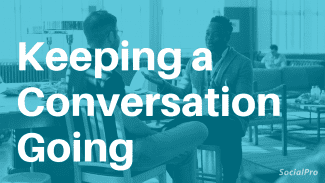Most of our articles on social skills focus on making conversation, but what should you do when talking to people is your biggest problem?
Lots of us become self-conscious or anxious during conversations, which can mean that we struggle to express ourselves clearly. This makes conversations really difficult and can even leave you feeling mute.
In this article, I’m going to go through some reasons you might find talking to people difficult and what you can do about it.
Why you might find it hard to talk
1. Trying to speak too quickly
Trying to speak too quickly can make it hard to talk in lots of different ways. You might trip over your words, speak too quickly for other people to understand, and sometimes you might find yourself saying something you really didn’t mean to say.
Give yourself time
Allowing yourself to speak more slowly makes it less likely that you’ll make any of those errors. Try taking a breath before you start speaking rather than leaping straight into the conversation. Use this time to make sure that you know what you’re about to say before you start speaking.
It might also help to try to speak more slowly while you’re speaking. Public speaking experts tell people to speak more slowly than feels natural, and that’s actually true for lots of us in conversations as well. It can be helpful to practice this in the mirror or talking to yourself when you’re at home alone.
2. Making too many “filler” sounds
Lots of us find ourselves saying “umm,” “uh,” or “like” over and over again as we try to find the perfect word to say, and these can actually be helpful. They do need to be in moderation, though. If you use them too much, you might sound less convincing, or you might get annoyed with yourself that you can’t just “get to the point.”
Practice saying things simply
This is something I’ve struggled with a lot, and writing for a living has really helped. It’s forced me to say things clearly and simply. I used to try to put too many ideas together in long, complicated sentences. That meant that I would often need to work out how best to express myself whilst I was already speaking. I would reflexively “cover” those moments with a filler sound, like “umm.”
Try writing your thoughts down or recording yourself speaking. Think about the sentences you’ve used and whether you could have put it more simply. For example, I might say:
“Yesterday, I was talking with Laura, my dog walker, about whether we should focus on recall or whether it would be better to improve the way that Oak pays attention to me when we’re on walks first.”
Honestly, you might have to read that a couple of times to make sense of it. It would be simpler if I said:
“I was talking to Laura, my dog walker, yesterday. We wanted to make Oak better behaved on walks, and we came up with two options. The first is to focus specifically on recall. The other is to work on making him pay attention to me during walks first, and then we can work on recall later.”
This was probably easier to follow, and I would be less tempted to use filler words because I wouldn’t have to think about how to finish the sentence. Sounding more authoritative and being easier to understand will both improve your conversation.
If you do find yourself struggling to think of what to say next, try to pause rather than use a filler word. You might not even notice when you use them, so consider asking a friend to point it out to you.
3. Finding it difficult to talk about feelings
Lots of people find it easy to talk about facts or current affairs but really struggle to talk about their feelings or how something is impacting them. This might be because you don’t want to make anyone else feel uncomfortable, or you might be scared of rejection.
Not wanting to share our feelings usually comes down to a lack of trust in the people we’re talking to. We might not trust them to care about us or to be sensitive and kind when we’re feeling vulnerable.
Develop trust slowly
Building trust is rarely easy, and it’s important not to rush it. Trying to force yourself to trust people too easily could lead to you trusting someone more than they deserve and things going wrong as a result.
Instead, try to offer trust in small pieces. You don’t need to talk about your deepest, most traumatic feelings straight away. Try expressing a preference, such as “I love that band” or even “That film made me really sad.”
Notice how much other people share with you. You’ll probably find that other people will start to share more about their feelings the more you share about yours. Only share as much as you feel safe sharing, but try to push a little towards the edges of your comfort zone.
4. Struggling to find words
That feeling when the right word is “on the tip of your tongue” is incredibly frustrating and can easily derail your conversation. It happens more often with nouns and names than it does with other words. Almost everyone struggles with tip-of-the-tongue experiences pretty regularly (about once a week),[1] but it can leave you feeling awkward and embarrassed.
Be honest
Trying to hide the fact that you’ve forgotten a word, or pressuring yourself to find it quickly, will often make it worse. Being honest about the fact that you’ve forgotten the word and how it makes you feel can help.
Recently, I was a bit stressed, and I noticed that I was struggling to find the right word a lot. I tried to cover it, saying “thingy” or “wotsit” whenever I couldn’t remember. My partner found this really funny and laughed at me, which made me feel worse. He wasn’t trying to be mean. He just didn’t know that I was feeling bad.
After a week or so, I explained. I said, “I know you’re not trying to be mean, but I’m really struggling to find the right words at the moment. I don’t like it, and it makes me feel bad when you laugh at me about it.”
He stopped drawing attention to it. I stopped saying “thingy.” Instead, I stopped speaking when I couldn’t find the right word. I’d say, “Nope. I can’t remember the word,” and we’d work together to work it out. After just a few days, it had stopped happening so often.
Try being honest when you can’t find the words. Because everyone knows how it feels to have a word on the tip of your tongue, most people will try to help you find the right word as soon as they realize. Being able to admit that you’re struggling can also make you look more confident to others and even make you feel more confident yourself, which is an added bonus.
5. Not being able to articulate thoughts
Sometimes the problem isn’t that you’re struggling to find specific words, but rather that you can’t find a way to put your thoughts into words at all. You might instinctively “know” what you want to say but not be able to explain it in a way that makes sense to others.
Sometimes, you know you’re not explaining yourself well, and other times you think what you’ve said is perfectly clear, but the other person doesn’t “get it.” This can make conversations deeply frustrating and leave you feeling isolated.
Get your thoughts clear in your mind first
Most of the time, we’re much better at explaining things when we really understand the topic deeply. When we “kinda know” what we’re trying to say, we can become muddled and confused. This then confuses whoever we’re talking to. Take a moment before you speak to be clear about what you’re trying to say. If you’re trying to say something quite complex and you’re worried thinking it through will take too long, you can even say so.
Try saying, “Just a second. This is a little bit complicated, and I want to make sure I explain it properly.” That can buy you the time to get your thoughts in order before you speak.
It can also be helpful to think about what the other person already knows. Talking to someone isn’t like writing a textbook. You want to adjust what you say to fit with their experience and understanding.
For example, if I’m talking to another counselor, I might use the words “working alliance” because I know that they’ll understand what I’m saying. If I’m talking to someone who hasn’t had counseling training, I might say, “the way a counselor and client work together to help the client.”
We have a separate article on how to be more articulate, which has more advice.
6. Being too tired to concentrate on conversation
Being exhausted or sleep-deprived can make conversation incredibly difficult. The more tired I get, the more I say the wrong thing, mumble and (occasionally) talk absolute gibberish. You might notice the difference if you’ve stayed up all night, but longer-term lack of sleep can lead to subtle difficulties in making conversation.
Rest and avoid important conversations when you’re sleepy
We all know that it’s good to get enough sleep, but this can be difficult, especially in a busy modern world or when you’re really stressed. Keeping good sleep hygiene is important.
It’s also helpful to self-monitor and to try to recognize when you’re not at your best due to a lack of sleep. If you realize that you’re tired (and possibly a little grumpy too), try to postpone important conversations to a time when you’re better able to deal with them.
7. Becoming tongue-tied talking to a crush
No matter how eloquent or confident you are, talking to someone you’re romantically interested in can raise the stakes of the conversation and make it much more stressful. For most of us, this can then lead us to struggle to express ourselves, panic and say something stupid or retreat into our shell and stay quiet. None of these is a particularly helpful response when you’re with the man or woman of your dreams.
When we look at someone from a distance, we create an image in our mind as to what kind of a person they are. Try to remember that this is your image of them, not the person themselves. Until you get to know someone, you’re actually being attracted to your image of them.
Lower the stakes of the conversation
Talking to your crush doesn’t have to be about sweeping them off their feet or astounding them with your brilliance and wit. The aim is to show them, honestly, who you are and to try to find out who they are. Try reminding yourself, “This isn’t a seduction. I’m trying to get to know this person.”
It can also be helpful to have more frequent, shorter conversations. If you feel that a conversation is your only chance to impress someone, you’re more likely to be anxious about it than if it’s just one conversation among many. This can help you to relax and be yourself.
8. Zoning out
Almost everyone knows what it feels like to zone out during a conversation. Zoning out is bad enough, but it can be incredibly difficult to rejoin the conversation once your attention has come back. This is because you might not fully understand what people are talking about now or be worried about repeating something someone else has said previously.
Improve your attention
In this case, prevention is better than cure. We have loads of tips to help you avoid zoning out in the first place, so try to practice at least a few of these.
If you notice you have zoned out, the best solution can often be to apologize and then renew your attention. As long as you don’t do this too often, most people will understand and be grateful for your honesty.
9. Avoiding painful topics
Sometimes we’re perfectly comfortable making conversations about general topics, but we struggle to talk about difficult issues that we’re currently experiencing. Not being able to share current pain can leave us feeling isolated, vulnerable, and prone to depression and self-harm.[2]
Ask for what you need
When things are really difficult, it’s completely OK to ask for exactly what you need. In fact, most people will be grateful that you’ve given them a guidebook, as they may be worrying about how to help you.
Often, this can involve them just sitting with you, not expecting you to talk. If that’s what you need, try saying, “I really can’t talk about this right now, but I don’t want to be alone. Would you just sit with me for a while?”
You may find that you want to talk about things after a period of sitting together, or you might not. Whatever you need is OK.
10. Feeling that talking isn’t worth the effort
Sometimes you can struggle to talk to people because it feels like far more effort than you’re willing to spend. I think most people can empathize with that feeling.
There are two parts to this problem. One is that talking to other people can take a lot of energy. The other is that talking to people can feel unrewarding. Either of these can lead to you feeling that making conversation just isn’t worth the effort.
If there are just a few people who leave you feeling this way, try to accept that the problem might not lie with you. It might not be their fault either. It’s just that the two of you don’t gel well together. If you feel this way about most or all people, you might want to think about your underlying assumptions.
Prioritize your feelings to reduce exhaustion
It might surprise you to know that lots of socially skilled people find talking to people pretty tiring. This is because we’re trying to read the other person’s body language, understand their viewpoint, think about the conversation topic, and think about what we’re about to say, all at the same time. That’s a lot to think about, and we have our own feelings to manage as well.
If you’re avoiding talking to others because of the hard work involved in paying attention to their feelings, try giving yourself permission to focus more on yourself than the other person.
Try saying to yourself, “I’m not responsible for them. My job is to make sure that I enjoy this conversation.” I’m not suggesting that you be a jerk, but you don’t need to be so alert to the other person’s needs that it’s keeping you on edge.
Understand the point of small talk to find it rewarding
Small talk is rarely rewarding in and of itself, especially if you’re more introverted than extroverted. Try to shift your mindset and view small talk as being about building relationships and trust. During unrewarding conversations, try telling yourself:
“I might not care about the weather/traffic/celebrity gossip, but I’m showing that I can be trusted. This is how I earn deeper conversations and friendships.”
11. Mental health issues
Many different mental health issues are associated with difficulty making conversation or struggling to enjoy those conversations. Social anxiety, depression, Aspergers, and ADHD are particularly known for their impact on your conversation, as well as more specific conditions such as selective mutism.
Seek treatment for underlying conditions
For some people, a diagnosis can feel like a final judgment, setting limits on their social experiences forever. For others, it can feel like an opportunity, giving them access to the help and treatment they need to improve their lives.
Try to remember that you don’t need to suffer in silence. Seek out treatment with a practitioner you trust. Your doctor will usually be your first point of call, but don’t be afraid to find someone who makes you feel comfortable.













